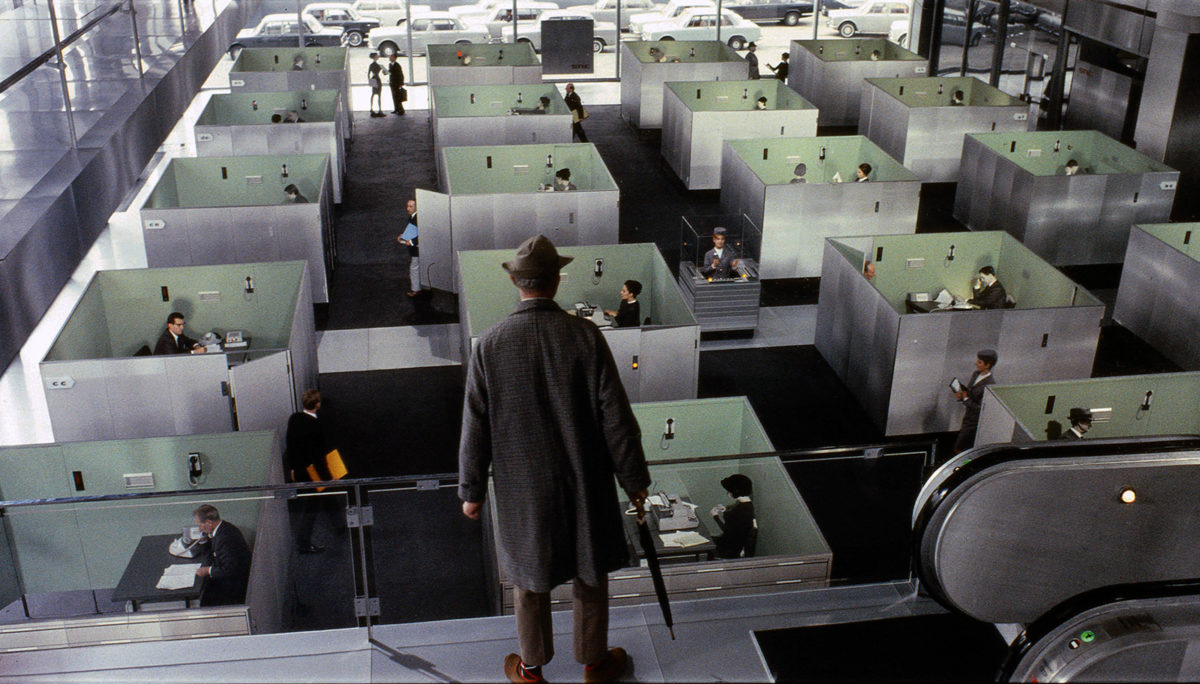Technische fiche
Lees meerLees minder- publicatiedatum
- 3 juli 2020
- organisator
- VAI, CIVA en ICA
Observation of the probable return of the damned cubicle, the ultimate compromise between isolation and connectiveness.
Opiniestuk over the cubicle als kantoorinstrument en hoe Corona onze fysieke leefwereld veranderd. Opiniestuk geproduceerd op vraag als deel van 'Desired Spaces' (VAI, CIVA en ICA)
I want us to be clear about one thing: this is no celebration of the (damned?) cubicle. It’s rather an observation, like how we would observe the movements of bees, without having strong opinions about it. After its glory days in the American skyscraper the world turned its back on the cubicle. It was a despised architectural materialization of ‘work’. Its main problem seemed that it converted people into an anonymous workforce. You’re just a clog in the machine, you’ll never escape your cubicle. We all collectively remember the cubicle-horrors in movies such as ‘Office Space’ (1999) – eternal boredom, being stuck, being subjugated- or ‘playtime’ (1967) – your identity is irrelevant. The world is through with the cubicle it seems, we’ve moved on now to landscape offices and even further so, to the funscape offices: write your reports on the swing, get your inspiration on the couch.
I sometimes wonder if we’ve been too quick to dump the cubicle. What is a cubicle? Is your own space. Not only literally, but even figuratively, your own headspace. It’s a place to retreat from the frenzy. It’s like working in a coffee shop: the noise and hustle and bustle are still there, but it becomes this soothing white noise, comforting, whilst slowing pushing you into deep concentration. In that way the cubicle is not the same as a closed door office (Donald Draper in Mad Men, you better knock first) or a low-stimulus grotto (see ‘Saint Jerome in his study’ by Antonello Da Messina (1492) or Thoreau’s ‘Walden’ (1854)). People can still get your attention at unwanted moments. Phones will ring. Paper airplanes will fly. The cubicle isn’t strict isolation. It’s a mediator. It’s a compromise: offering you the availability of deep focus, while also offering the social benefits of the landscape office. In a post-pandemic world, where social distancing is (for now) the norm, perhaps the cubicle as typology is worth reconsidering: safely working apart together, without having to retreat every single day in your home office. The office brand ‘Buzzispace’ has been developing privacy booths for a while now. Perhaps we’re ready.
Sure, I bet if you’re in there all the time, it kind of gets lonely and closed in. But that’s the case with a lot of things. Aren’t we sometimes closed in by the openness of the landscape office? The downside of the landscape office isn’t new information. There so much knowledge already concerning ‘deep focus’ and the lack of it in an open office plan. This pandemic made it very clear: to do great things, to write a novel for instance, you sometimes need ‘a room of one’s own’ (Virginia Woolf, 1929). If we’re mixing stuff up already in the workplace, installing swings and gyms in our offices, why not seriously reconsider the cubicle as a part of that new office? You don’t have to be in there all the time, we’re nomadic workers anyway. If you’re sick of it you’ve still got flexdesk, standing desks, telephone booths, your favorite coffee bar, your attic and off course, the can-be-missed pingpong table.
